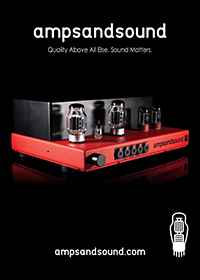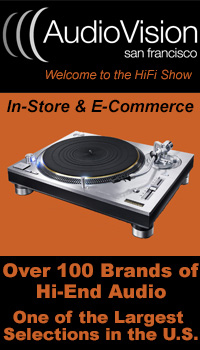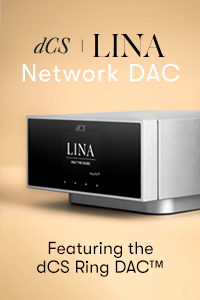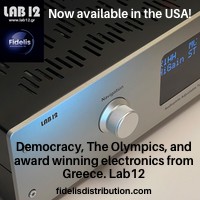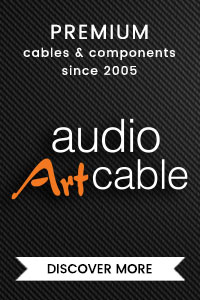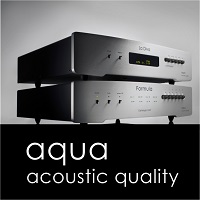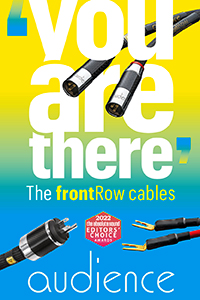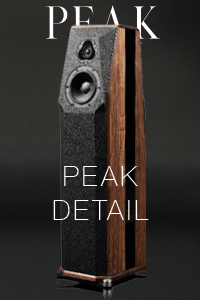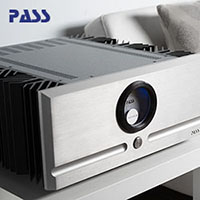Sometime back in the early 80’s Roger Van Oech wrote a book titled A Whack on the Side of the Head focusing on creative solutions to problems that one might not have considered without being taken outside of their comfort zone. The new Harbeth Compact 7ES-3 is the perfect example of this.
The first whack on the side of the head came when visiting Acoustic Sounds years ago covering the Blues Masters concerts. Listening to the Avalon Sentinels in their main sound room was my top priority, but what I heard in the second room was just as amazing considering the price. No, you can’t have the sound of a pair of Avalon Sentinels for 3,500 bucks, but you can achieve substantial musical enjoyment with these small boxes at a price that is accessible to most music lovers. Today, the 7ES-3 sells for $3,690 – $3,990, depending on finish.
Spending the evening listening to the Compact 7s in a friends house in an outstanding system, consisting of the SME 20 turntable (with Koetsu Urushi Blue cartridge) and Croft’s best amplifier and preamp, proved highly impressive. After calling it a night around 2a.m., it was settled that the Compact 7s would head our way for a review.
All new from top to bottom
First, forget any kind of built in prejudice you might have about “The British Sound”, just producing good midrange and forgetting the extremes. None of that applies to the new Compact seven. That’s not to say they aren’t musical, but they are open and dynamic in a way that isn’t the norm from the likes of Spendor, ProAc or any of my other favorite British speakers, even the Compact seven version 2 for that matter. None of the legendary BBC accuracy has been sacrificed, however these speakers now have more resolution as well as more extension at both ends of the frequency spectrum.
Though version three looks the same as version two, it is a completely new speaker from the drivers to the crossover components. The woofer features Harbeth’s new Radial 2 technology, used on the more expensive Monitor 30 and 40 along with a new tweeter. We could write pages about all the techie stuff, but suffice to say it works tremendously well. A quick trip to the Harbeth site (www.harbeth.com) will answer all of your in-depth technical questions.
The Compact 7ES-3 impedance is rated as 6 – ohms and it is equally at home with tube or solid state electronics. Though the spec sheets suggest slightly low sensitivity at 86db/1 watt, we had no problem driving these with amplifiers possessing 30 watts per channel and up.
Incredibly un-fussy
Alan Shaw, Harbeth’s director and designer of the Compact 7 advised putting the speakers on 19 – inch stands in place of the 24 – inch stands at my disposal. This proved spot on. Unless you have a very tall listening position, getting the tweeters up on 24 – inch stands makes for an uninvolving listening experience. Both Mr. Shaw and I suggest the Sound Anchor stands, built specifically for this speaker. A pair will set you back about $625 plus shipping, but it is money well spent. While others swear by the Skylan wood stands, I am not a fan – they tend to muddy the lower mid/upper bass region too much for my taste. The Sound Anchor stands give these speakers the authority they deserve.
For the novice audiophiles in the audience, these are incredibly easy speakers to set up. While a little bit of futzing will help the ultimate imaging performance of the Compact 7’s, just getting the speaker height correct will get you 80% of the way there. A bit of time with the tape measure and a little bit of room treatment will give you the last bit of performance they are capable of, but in short, the Compact 7s are not tough to achieve great sound with.
Listening began with Shunyata’s Orion speaker cables from my reference system, but enjoy the ED 415 speaker cables as well. These cost $450 a pair and are a fantastic match for the Compact 7s. Experimenting with other from Cardas, Furutech and ALO Audio all gave excellent results, confirming that these speakers are not terribly cable dependent.
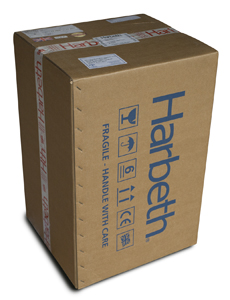 Tonemasters
Tonemasters
The Harbeth Compact 7ES-3 is one of the most enjoyable speakers I’ve heard in the last few years, regardless of price. They offer tremendous balance, with strong bass down to about 45hz, (according to Harbeth, they have a measured frequency response of 45- 20khz with the grilles on) and what’s there is solid, accurate and full of detail. The midrange is also very correct; when you listen to a piano, it sounds like a piano. I can listen to someone play a Steinway on the Harbeths, go in the house and plunk around on our Steinway and hear a very accurate resemblance.
In a small to medium sized room move enough air to give a good feel of dynamics – a very important aspect of musical reproduction that is often overlooked. Push them too hard and they will flatten out instantly. The threshold from playing fairly loud to compressing is very immediate; you will know when you’ve hit the wall. Fortunately, that wall is at a high enough sound pressure level that all but the most crazed rock and rollers will be more than happy.
The Compact 7’s also do a fantastic job at having an airy presentation with just the right amount of decay that again, gives that feeling of acoustic instruments sounding correct. A familiar acoustic guitar record instantly confirms this. The image presented by the Harbeths doesn’t extend all the way to the side walls as it does with a panel speaker, but with good recordings it extends well beyond the speaker boundaries.
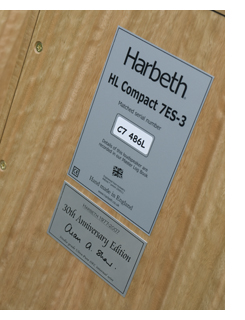 Chameleon – like
Chameleon – like
Where version 2 of the Compact 7 had a definite wooly character, the current speaker does not. These speakers are revealing enough to take on the characteristics of the electronics behind them. Those favoring the “classic British” sound will be better served by a more traditional sounding valve amplifier. The McIntosh MC275 served this purpose perfectly, adding a bit of warmth and tonal saturation to the presentation.
The Naim Supernait, in for review, was the ying to the Mac’s yang, producing plenty of PRAT and dynamics, as did the Conrad Johnson Premier 350. The Luxman L590A -II integrated, with 30 watts per channel of Class – A power was the staff favorite, offering the best of both worlds for all audiences.
Combining the Luxman with the Rega P9/Lyra Skala combination is analog bliss. The wind chimes in Santana’s Abraxas (MoFi version) on the opening track floats around the speakers as if a small pair of surround speakers are hidden somewhere, and the layers of percussion in this classic recording are a delight to partake.
Vocals emerge up and out of the soundfield created with ease, the Compact 7s dissapearing in the room, making it easy to concentrate on the music. Old favorites from Ricki Lee Jones, Tom Waits and Johnny Cash all proved compelling. At the price asked, the Harbeth Compact 7ES-3 is a speaker without fault – they are faithful to the music.
Those wanting to rock out with the Compact 7s will not be disappointed, provided you have a high current solid state amplifier at your disposal. Switching the program material from James Taylor to Deep Purple was easy when using the Premier 350, allowing for sufficient dynamics and bass control.
Long term listening
While the review above was originally featured in issue 16, my enthusiasm for the Compact 7 remains strong as ever after using these speakers as a reference for a few years now. I’ve also had the chance to use them with a much wider range of amplification, and pretty much the only amplifiers that won’t drive them are of the 300B and 2A3 vintage – they really need at least 30wpc and you won’t regret having more if it’s convenient.
Best of all, these speakers still remain highly true to the music. Others dazzle and sizzle, either with fancier cabinetry, or voicing trickery, but an oboe sounds like an oboe when played on the Compact 7s and that’s something even a few five – figure speakers can’t get right. These speakers have been tuned to perfection in the BBC tradition to achieve a natural midband, and the result is a highly resolving, yet low distortion speaker that you can listen to for hours on end without fatigue.
Four years later, the price has not increased – a testament to Alan Shaw running a tight ship. The Harbeth Compact 7ES-3 remains one of the best buys in high-end audio.
The Harbeth Compact 7ES-3
MSRP: $3,960 in eucalyptus, $3,690 in cherry
Manufacturers Information
www.harbeth.co.uk (factory)
www.fidelisav.com (US Importer)
Peripherals
Preamplifier: Conrad Johnson ACT2/series 2
Phono Preamplifiers Nagra VPS, ASR Basis Exclusive
Analog Sources Continuum Criterion w/Copperhead arm and Dynavector XV-1s, Rega P9 w/RB1000 arm and Dynavector XV-1s
Digital Sources Naim CD555
Power Amplifier Conrad Johnson Premier 350, McIntosh MC275
Interconnects Cardas Golden Reference, Shunyata Antares
Speaker Cables Shunyata Orion
Power Running Springs Dimitri and Jaco




